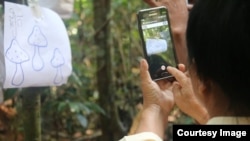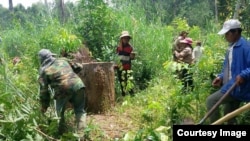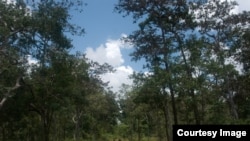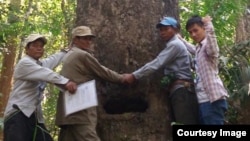In late November 2011, Minh Ny found himself in a brawl with a group of heavily-armed policemen in Kompong Thom province’s Sandan district as the police attempted to handcuff the late environmentalist Chut Wutty.
“Many of our people challenged them to pull Mr. Chut Wutty away from being arrested by the police,” Ny said. “After brawling with us, police decided to withdraw before we escorted him back to [Sandan] district town, where he was safe from police detention.”
Ny, a 52-year-old from the Kuoy indigenous minority, said the encounter was typical of the one-week campaigns against loggers that villagers have been conducting for almost a decade. Deep in the jungle, they confiscate chainsaws and logs from illegal loggers, often attracting the attention of local police in the process, he said.
Chut Wutty made his name as a fearless organizer, bringing together hundreds of local people in unprecedented civilian action to protect Prey Lang, one the world’s last intact lowland rainforests.
But after Chut Wutty was gunned down by a military police official while investigating forest crimes in Koh Kong province in mid-2012, the Prey Lang Community Network that he helped set up has not gone away, to the chagrin of those who profit from Cambodia’s rampant illegal timber trade.
In late September, the network was selected as one of the world’s top 21 local community groups working for environmental conservation in the United Nations Development Program-supervised Equator Prize 2015. On its official website, the Equator Prize states that it “recognizes outstanding local achievement in advancing sustainable development solutions for people, nature and resilient communities.’
The Prey Lang Community Network’s stated mission is to guard Prey Lang through community action against loggers, and through disruption of agro-industrial companies granted land concessions in forested areas, said spokesman Seng Sok Heng.
Prey Lang is home to some 350,000 people, mostly from the indigenous Kuoy community. But since the government began handing timber concessions out in the late 1990s, the forest has been disappearing, upsetting the traditional livelihoods of the people, who rely on forest products to survive.
Sok Heng said that forming a community network was a natural fit with the local people’s communal traditions.
“The ethnic communities have historically been networked for a long time,” said Sok Heng, “but there was no joint working system of networks.”
As deforestation linked to land concessions gained pace through the 2000s, communities were kicked off their land, and a movement of resistance to the destruction of their ancestral home became necessary, said Sok Heng.
With help from other advocacy groups and nongovernmental organizations, the Prey Lang Community Network was officially formed in 2007. Chut Wutty’s Natural Resources Protection Group, as well as the Cambodian Centre for Human Rights (CCHR), have worked closely with the network throughout its existence.
The network’s activities have not been always welcomed by local government officials, some of whom Sok Heng accused of being in cahoots with illegal loggers.
“When we are doing our works in cracking down on deforestation, we always inform and report to them [the authorities],” the group’s spokesman said. “However, the feedback and response are very poor, unless there is an order from their superiors or central government officials.”
Som Sean, another villager in Sandan district, said he was once forced to flee temporarily to Phnom Penh after he was threatened for his participation in anti-deforestation activities. He was warned that police and loggers wanted him secretly disappeared.
“The loggers accused me of being an oppositionist,” he said, “and the authorities were scared of losing their benefits [from illegal logging]. They warned me against attempting secession [from the state].”
Sean said he and another activist decided to return back home after 20 days hiding out in Phnom Penh under the protection of an NGO.
Both Environment Ministry spokesman Sao Sopheap and Forestry Administration chief Chheng Kimsun declined to comment on either the prize or the network, referring questions to the Ministry of Agriculture, whose spokesman, Eang Sophalleth, could not be reached.
Uth Sam Orn, governor of Kompong Thom province—which contains a large part of Prey Lang, had some praise for the network’s efforts toward what he called the “joint mission” to protect forests. However, he claimed the group did not always inform authorities of its actions, leading to suspicions that its activities were “political.”
“In some cases, we are unclear about their actual will and objectives,” he said. “We are worried that it is not only for an environmental purpose, but for political purposes.”
But both Sam Orn and Sok Heng said a détente had arisen in Prey Lang recently, with authorities and activists cooperating now, after years of troublesome confrontations.
Ou Virak, a human rights advocate who in his previous role as president of CCHR spent time patrolling Prey Lang with members of the network, said the community had shown an exceptional and unique commitment to protecting the environment and their traditional livelihoods.
Especially praiseworthy, Ou Virak said, was the network’s willingness to confront often-violent loggers. “They deserved to be prized and praised,” Ou Virak said. “I saw with my naked eyes the way they worked from their hearts.”
When the network was named a winner of the Equator Prize, both Minh Ny and Som Sean learnt the news on social media via their smartphones. In the group’s latest innovation, they are employing the devices to document illegal logging in the forest.
Ida Theilade, a senior researcher at the University of Copenhagen who recommended the Prey Lang Community Network for the prize, told VOA Khmer by email that the use of technology was furthering the group’s ability to stand up for vulnerable local communities.
“The community network members use new communication technologies to document forest crimes in protecting natural resources, and biodiversity,” she wrote, adding that the network was working with local and international partners to document illegal logging.
But winning the prize will mean little if the the destruction of Prey Lang continues. Sok Heng said that most of the high-value luxury timber in the forest had already been logged by criminals that the local community has been unable to stop.
“Prey Lang will vanish very soon if such things keep happening,” he said.
Ny, a father of seven, said some sacred areas of forest have already gone.
“We used to respect huge trees that are believed to contain the souls of spirits that we have always prayed to,” he said. “Now the big trees have gone, so have our beliefs.”












